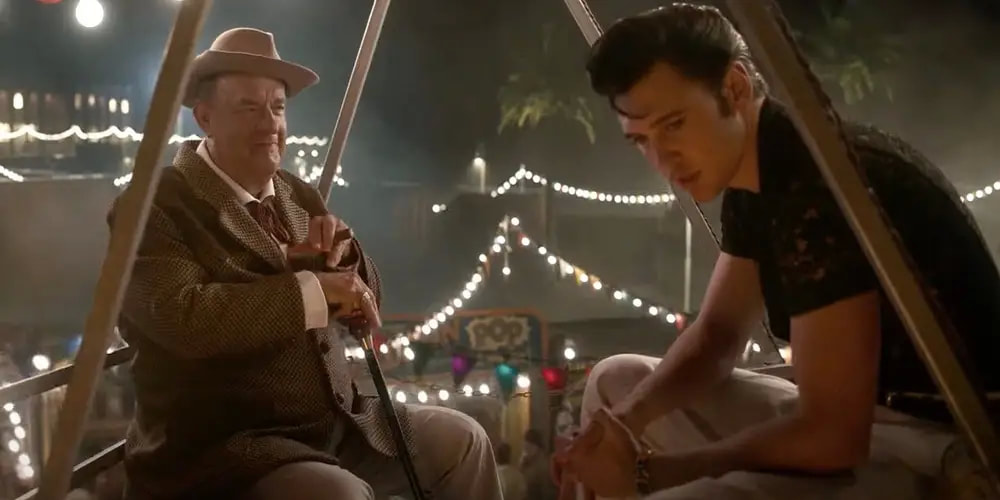|
by Julian Spivey Director: Baz Luhrmann Starring: Austin Butler, Tom Hanks & Helen Thomson Rated: PG-13 Runtime: 2 hours & 39 minutes Elvis Presley just wanted to sing and be loved. Colonel Tom Parker just wanted his carnival sideshow chicken to dance for money. This is essentially the premise of director Baz Luhrmann’s epic Elvis Presley biopic “Elvis,” in theaters now.
“Elvis” is Luhrmann’s first film in almost a decade since 2013’s adaptation of The Great Gatsby and only his sixth film in his 30-year directorial career. He doesn’t rush to pop out film after film, meaning if he’s doing one it’s most likely a passion project. Luhrmann’s hand is all over “Elvis,” from the creative flourishes behind the camera and penning the script with Sam Bromell, Craig Pearce and Jeremy Doner. The film is expansive – covering Presley’s career from its beginnings to his young death. An interesting aspect of “Elvis” is choosing the film’s villain Colonel Tom Parker to be its storyteller. The film opens with Parker (played by Tom Hanks in an unusual heel turn) being rushed to a Las Vegas hospital in 1997, 20 years after the death of Elvis. Parker is old and his health failing, and he takes us viewers on his career’s magnum opus, which was the guiding and controlling of Elvis from Memphis kid just wanting to sing R&B to the biggest pop culture superstar the country and even world had ever seen. Parker was a carnival worker by trade who became musical promoter and manager for country music acts like Hank Snow and stumbled upon Elvis at the Louisiana Hayride radio show early in his Sun Records days when he sees the way young women in particular are taken by his music, but mostly his physical persona and gyrations on stage. He doesn’t see Elvis the man or Elvis the artist. He sees dollar signs from the beginning and no matter how much he fools Elvis, those surrounding Elvis or even himself he'll never see him as anything more than his dancing chicken. By the time Elvis realizes Parker’s ill intentions it’s much too late. “Elvis” is the story of an all-time legend – one who would’ve been such no matter who managed him – and the conman who ultimately brought him down. Austin Butler was essentially an unknown. He had roles in two short-lived, unacclaimed television shows before beating out major names like Harry Styles and Miles Teller for his breakthrough role as Elvis. It’s clearly a star-making turn for Butler who absolutely holds his own playing off of Hanks, one of cinema’s all-time greatest actors, for more than two-and-a-half hours. Never does it feel like Butler is outmatched and that’s utterly amazing. A bad or even slightly underwhelming performance from Butler would’ve greatly harmed the overall impact of “Elvis” and he pulled it off filling the world’s most famous jumpsuit. I’ve seen a great number of Hanks performances and can’t remember him ever playing a villain. His turn as Parker is brilliant, I hope Academy Awards voters remember a June release when it comes time to vote for Best Supporting Actor at next year’s Oscars. Parker’s selfishness and “me first” personality just ooze out of Hanks the entire film. The supporting cast of Olivia DeJonge as Priscilla Presley (Elvis’ wife), Helen Thomson as Gladys Presley (Elvis’ mom) and Richard Roxburgh as Vernon Presley (Elvis’ father) are adequate and don’t need to be anything more as the movie isn’t really focused on those close to Elvis other than Parker. As for Luhrmann’s impact on the film there’s absolutely no doubt you’re watching a Luhrmann film from the very beginning with its resplendent colors, fast-paced movements and editing and the use of modern music, especially hip-hop throughout a film about the so-called King of Rock & Roll. Some of these, especially the use of hip-hop, are flourishes that might affect the opinion of the film from some of the older theater patrons, no doubt longtime fans of Elvis hoping to see his life on the big screen, but honestly they work – maybe not as well as in older Luhrmann films like 1996’s “Romeo + Juliet” and 2001’s “Moulin Rouge,” where they’re large, important factors in those films – but it’s certainly not a detriment to “Elvis.” The only thing about “Elvis” I could really say is a bother is its two hour and 39 minute runtime – which has been a common criticism for me lately of film. There’s not really anything specifically I’d care to see cut out to shorten the runtime, but the length of the film did allow me at least once during the showtime to lose focus temporarily and think about how actor Richard Roxburgh reminded me of old Hollywood actor Robert Ryan in terms of looks. If you can avoid losing focus simply due to the long length and today’s short attention spans you’ll find yourself enjoying “Elvis.”
0 Comments
Leave a Reply. |
Archives
July 2024
|
